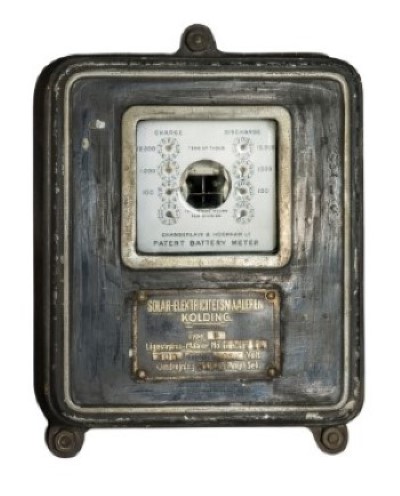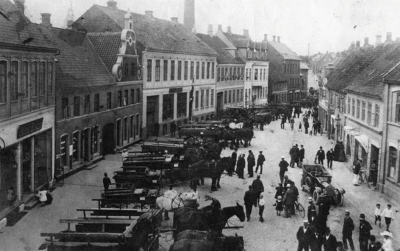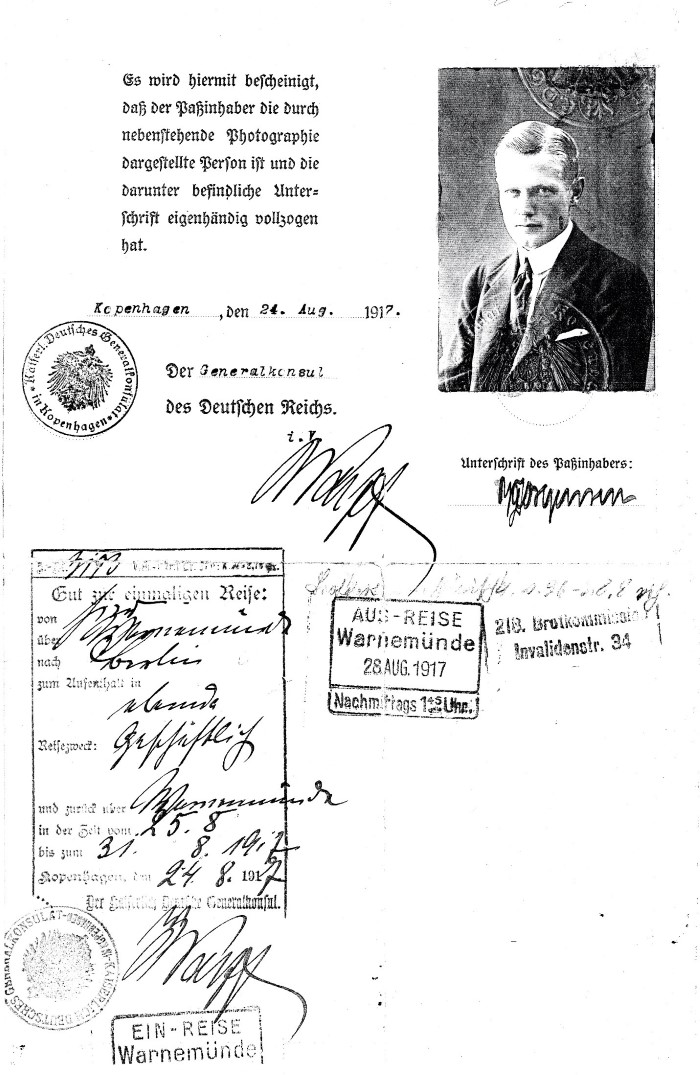Chapter 1: 1912 - 1919
An ambitious entrepreneur moves to Kolding
Driven by a glowing interest for the growing electrical business, a young ship construction architect sets out from Hamburg in Germany for Kolding in Denmark in 1912. Equipped with confidence and a lot of can-do spirit he plans to establish a business selling electrical metres.
At 21, Jacob Jørgensen moves to Kolding in February 1912 to become an independent merchant. He is determined, has seen the potentially huge market for metres, and aims to become a Nordic importer of semi-manufactured metre parts from the English company Solar Works.

Through his education and working in Germany, the young man keeps abreast of the fast penetration and use of electricity. He has strong faith in the future and will make his own business in Kolding with strong reliance on technological progress.
Jacob Jørgensen is determined and focused on working towards expanding his collaboration with Solar Works. When he obtains a status as importer in 1913, he immediately initiates the establishment of the company ”Solar Elektricitetsmaaleren v/ Pedersen & Jørgensen” together with his brother-in-law Søren Christian Pedersen.
According to the law, Jacob Jørgensen is, however, three years too young to own a company. But that doesn’t hold the eager entrepreneur back, though. He quickly finds a “straw man” with the same last name and understands how to wind his way to accomplish his goals. Jacob Jørgensen appoints himself day-to-day manager and establishes the company in a basement in Bellevuegade in Kolding.
Things quickly speed up. The Solar metres are sold to the fast increasing number of electrical power plants that emerge in the border region. When the space becomes too small already in 1914, the company moves to the back building of Rendebanen 6, which belongs to the power station Kolding Elektricitetsværk. Here, they set up offices and a modern metre shop, where the demanded metres could be assembled and made to order.
War gets in the way
Even though the Solar metre company is well-established they are paralysed when World War 1 breaks out in 1914. Scarcity and significant import restrictions mean that the production of new metres cannot be sustained at the same intensity during the war.
Quick wits, inventiveness and quick adaption is needed. These are qualities that have been characteristic for Solar ever since. Jacob Jørgensen now buys and restores used metres and, at the same time, he decides to establish a small wholesale stock of electrical materials.
After the war ends, Kolding Elektricitetsværk experiences an explosive increase in the consumption of electricity, which makes it hard for the 20-year old power plant to keep up. It is therefore decided to build Denmark’s first hydroelectric plant in the hilly terrain near Harte Northwest of Kolding.
Kolding Elektricitetsværk is in charge of a large part of the work with establishing the Harte plant and therefore needs to design a special technical metre department at the premises at Rendebanen 6. This is where Jacob Jørgensen a few years before established the metre shop. This meant that the plant has to cancel the lease on a short notice and offers to take over the metre shop including equipment as a partial compensation.
For Jacob Jørgensen the offer comes at a very convenient time. The sale will bring in significant and needed capital. The electrical light bulb and the white light, which can replace the smoking paraffin lamp, are on their way to becoming a status symbol, and many affluent consumers become the first to have power installed in their homes.
The ambitious entrepreneur can see that the wholesale of electrical articles will quickly exceed the sale of metres, but he also knows that this development will require increased capital being tied up in his stock, which in short time, has increased to more than 15 metres of narrow racks.
Jacob Jørgensen takes advantage of the situation and acts quickly. He empties the premises at Rendebanen 6 and sells the metre shop including equipment to the power plant. In May 1919, he dissolves the company Solar Elektricitetsmaaleren v/ Pedersen & Jørgensen, and already the next day, he establishes the partnership Nordisk Solar Compagni v/ Sørensen og Jørgensen from the office on the first floor together with his friend Herluf Sørensen.

Image from: Kolding Stadsarkiv
This is how the foundation for the Solar we know today was established on 17 May 1919. There will, however, be many changes throughout the next 100 years, and Solar’s role as a creator of change and as a challenger soon becomes evident.
Read more in the next chapter, which will be published on 17 February 2019.
CV – Jacob Jørgensen
Kolding 1919
Personal data
Name: Jacob Lauritz Jørgensen
Date of birth: Born 17 January 1891
Place of birth: Sønderborg, which at the time belonged under Germany
Civil status: Married in 1918 to Marie Andersen, Vamdrup. The couple have a son named Harald and they all live in Kolding.
Address: Mazantigade 3 near Saxildhus in Kolding
Education and professional experience
1905 – 1906 Ship’s boy at the German school ship Potosi
1906 – 1909 Trains to be a ship constructing architect at shipyards in Flensburg and Eutin, Germany
1909 – 1910 Employed with Blom & Vos, Hamburg, and a power station in Hamburg
1910 – 1912 Employed as a sales representative and metrology expert with Solar Zähler Werke, Hamburg
01.02.1912 Immigrates to Denmark
1912 Represents the English company Solar Works in Denmark
21.07.1913 Founder and manager of Solar Elektricitetsmaaleren v/ Pedersen & Jørgensen
12.06.1918 Is accepted as a member of a business network in called Kolding Fodsportsforening af 1915 and is thereby recognised by the leading business network in Kolding.
24.04.1919 Sells the metre factory including equipment to the power station Kolding Elektricitetsværk
17.05.1919 Founder and manager of Nordisk Solar Compagni, Kolding, which sells electricity metres and related materials
Personal interests and qualifications
Interests: Electricity’s penetration of the market and the deriving business opportunities, ships, yachting, horses and riding
Languages: Masters Danish and German in writing and speech
Merchant: Has a distinct sense for great business acumen, is innovative and an initiator
Ambition: ”I want to make my first million before I’m 30”
Jacob Jørgensen's passport
